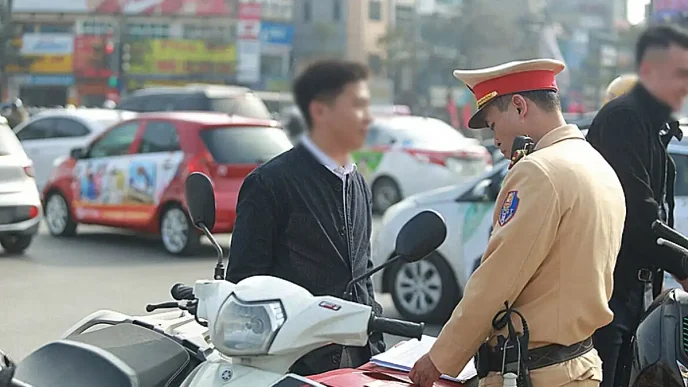In the early hours of August 8, a seemingly trivial disagreement over a 60 Thai Baht (~US$1.70) fruit purchase in Patong, Phuket, turned violent, leaving a foreign tourist with a serious stab wound to the abdomen. The incident, involving an Azerbaijan national and a local street vendor, has reignited concerns about tourist safety in one of Thailand’s most popular destinations, where violent altercations have marred the island’s reputation in recent years.
A Late-Night Altercation Turns Deadly
Patong Police responded to a distress call at 2:20 a.m. in front of Patong Medical Clinic on Rat-U-Thit 200 Pi Road, a bustling area known for its nightlife and tourist activity. Upon arrival, officers discovered the injured tourist, later identified as Orxan Hidayet Oglu Orkhan, 33, lying on the sidewalk with a severe abdominal wound. He was immediately transported to Patong Hospital for emergency treatment. Authorities have not yet provided an official update on his condition.
At the scene, police encountered the suspect, Pannawit Yongyosying, 25, who was waiting near the clinic. According to Patong Police, Pannawit admitted to stabbing Mr. Orkhan during a heated argument. The altercation reportedly began when the tourist consumed fruit from a sidecar stall operated by Pannawit and his girlfriend but allegedly refused to pay the modest fee. What started as a verbal dispute escalated rapidly, culminating in Pannawit using a knife to inflict a single stab wound to the tourist’s stomach. He was taken into custody for further questioning and legal proceedings.
A Pattern of Violence in Phuket
This incident is not an isolated event in Phuket, a province that draws millions of international visitors annually for its beaches, nightlife, and cultural attractions. Over the past year, several violent encounters involving tourists have raised alarm bells about personal safety. In January 2025, a 27-year-old security guard at a Patong construction site stabbed a tourist in the chest after a confrontation over public urination, leading to charges of attempted murder. Just months later, in April 2025, a 19-year-old Thai man was arrested in connection with a fatal stabbing near Phuket Town. Earlier cases, including a May 2024 stabbing of a British tourist and his wife near Bangla Road, and a February 2024 stabbing involving a British tourist in a dispute over services, further underscore a troubling trend.
These incidents, often sparked by minor disagreements, have fueled a perception among some visitors that Phuket—and Thailand more broadly—struggles with impulsive violence and inadequate safety measures. The Phuket Tourist Association has voiced growing concern over the impact of such events on the region’s image. In 2024, the association noted a worrying number of “foreigner deaths” and their potential to deter travelers. Acting Chief Justice of the Phuket Provincial Court, Kriangsak Rodpunshoo, acknowledged the issue during a meeting last year, highlighting a surge in criminal and civil cases involving tourists. He emphasized that this rise was affecting visitors’ confidence in their personal safety and casting a shadow over Thailand’s tourism industry as a whole.
Tourist Perceptions and Broader Implications
The stabbing of Mr. Orkhan over a sum less than US$2 has amplified frustrations among some tourists who feel that petty disputes in Thailand can escalate with disproportionate consequences. While many visitors continue to praise the country’s hospitality, cultural richness, and natural beauty, incidents like these often dominate headlines and shape negative perceptions. The emotional toll on witnesses and victims’ families adds another layer of complexity to the issue, as travelers weigh the allure of Thailand’s attractions against perceived risks.
Chinese tourist arrivals to Thailand, particularly Phuket, have declined significantly in 2025, with arrivals from China dropping by approximately 15% compared to 2023’s peak of 3.5 million visitors. High-profile incidents of violence, coupled with widespread reports of scams and kidnappings targeting Chinese nationals, have eroded traveler confidence. The January 2025 kidnapping of Chinese actor Wang Xing in Bangkok, followed by his trafficking to a Myanmar scam center via the Thai-Myanmar border, alongside a near-abduction of two Chinese tourists in Tak province, has fueled distrust.
Chinese social media platforms like WeChat and Douyin have amplified these concerns, with viral posts highlighting extortion, theft, and aggressive vendor disputes. A June 2025 travel advisory from the Chinese embassy in Bangkok urging caution has further deterred visitors, threatening Thailand’s tourism economy, which relies heavily on Chinese travelers’ substantial spending. This has led to a sharp downturn in Chinese property buyers on the island, now preferring Malaysia and Vietnam over once favored Thailand.
Thailand’s tourism sector, a critical driver of the national economy, relies heavily on its reputation as a safe and welcoming destination. Phuket alone welcomed over 9 million international visitors in 2023, according to government data, contributing significantly to local and national revenue. However, recurring reports of violence, scams, and other safety concerns threaten to undermine this vital industry. The government and local authorities face mounting pressure to address these issues through enhanced security measures, stricter regulations on vendors and service providers, and public awareness campaigns to prevent cultural misunderstandings that can lead to conflict.
Legal and Institutional Responses
In response to the growing caseload involving tourists, discussions have resurfaced about reopening a dedicated ‘Tourist Section’ at the Phuket Provincial Court. Proposed as a mechanism to streamline legal assistance for visitors entangled in civil and criminal matters, this initiative aims to rebuild trust among international travelers. Justice Kriangsak, in his 2024 remarks, underscored the urgency of such measures, noting their potential to mitigate the broader impact on tourism across Thailand.
As charges are prepared against Pannawit Yongyosying, the investigation into the August 8 stabbing continues. This case, like others before it, will likely serve as a litmus test for how effectively local authorities can balance justice with the need to reassure visitors of their safety. Pol Lt Col Somprasong Labaisat, Deputy Superintendent of Patong Police Station, led the initial response to the incident, signaling a commitment to swift action, but long-term solutions remain elusive.
Navigating Cultural and Social Dynamics
Beyond legal frameworks, the cultural dynamics at play in tourist-heavy areas like Patong warrant attention. Miscommunications over pricing, services, or behavior can quickly spiral into confrontations, particularly in high-stress environments where language barriers and differing expectations collide. While education campaigns for both tourists and locals could help bridge these gaps, implementation remains inconsistent. For now, incidents like the stabbing of Mr. Orkhan serve as stark reminders of the fragility of trust in tourist destinations.
As Thailand grapples with these challenges, the question looms: can Phuket restore its image as a safe haven for travelers, or will such violent episodes continue to cast a shadow over its sun-soaked shores? The answer may depend on the collective efforts of authorities, businesses, and communities to prioritize safety without compromising the warmth that draws millions to the Land of Smiles each year.
















